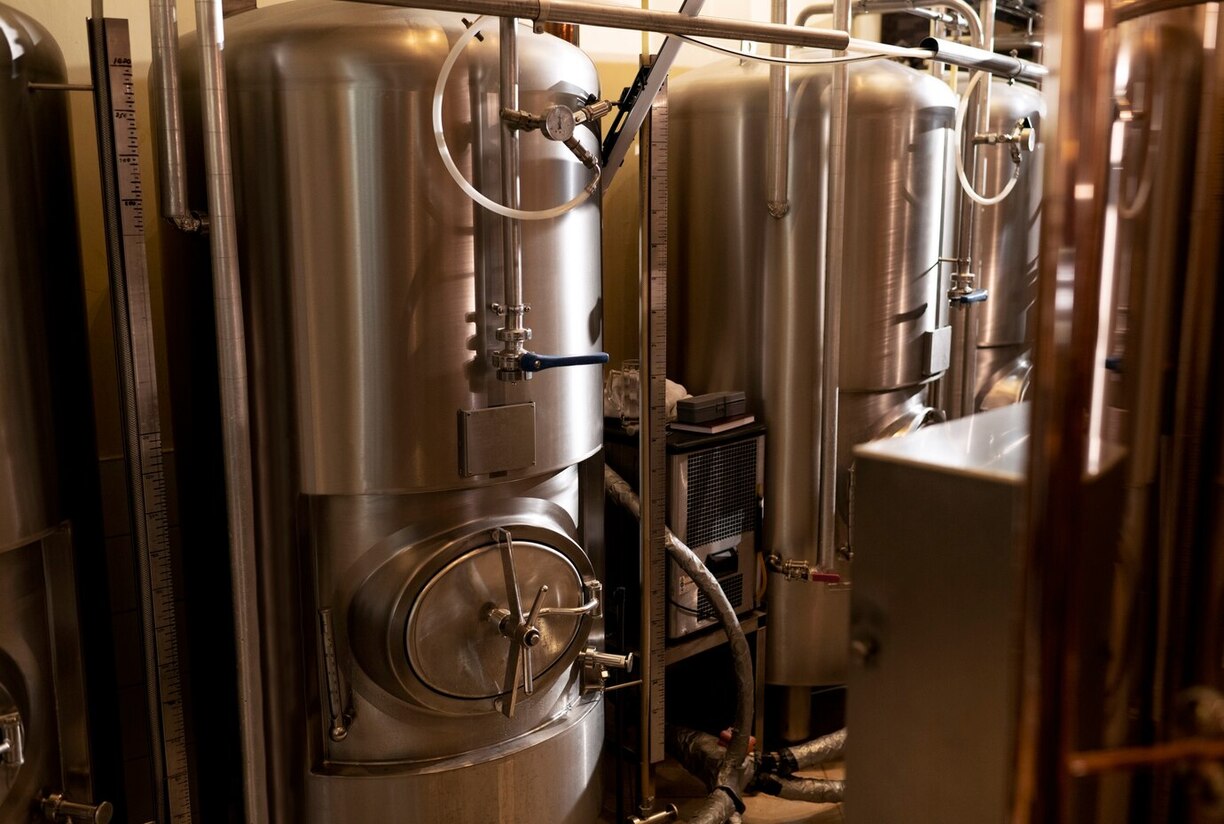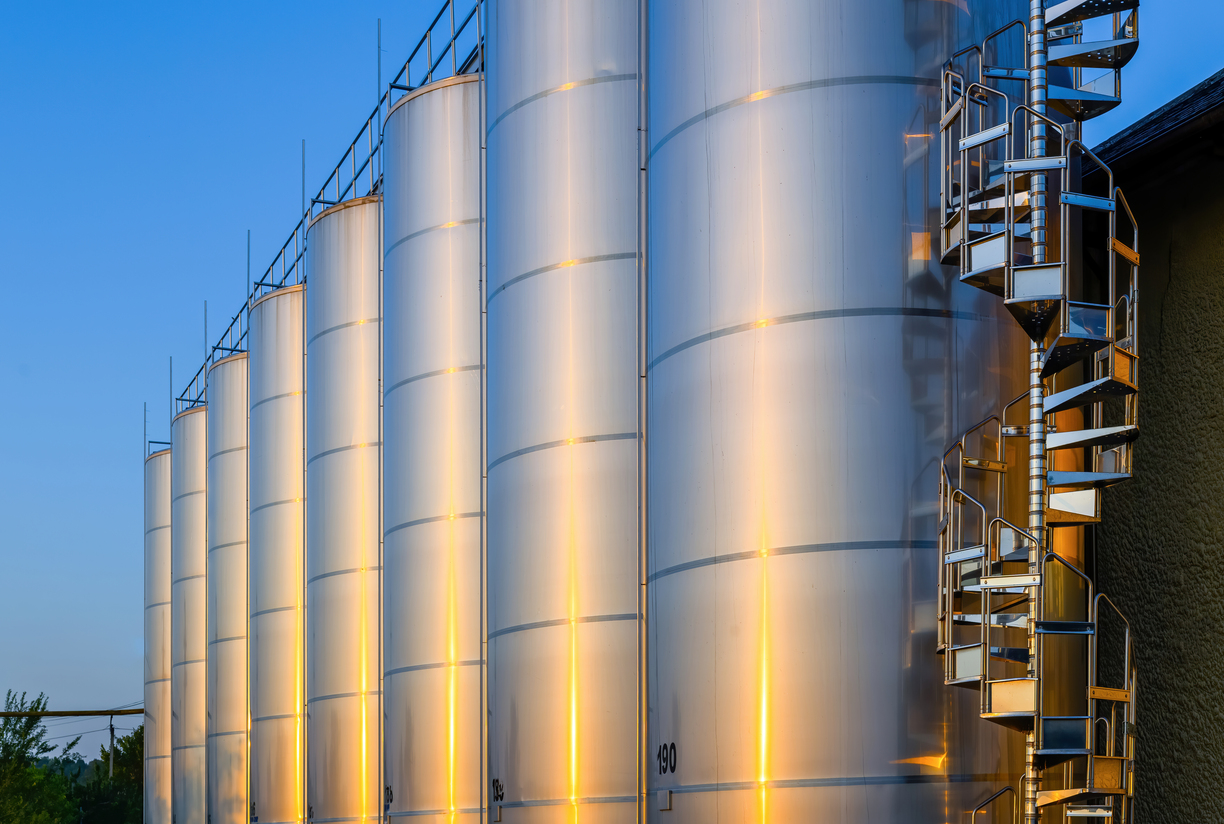Industrial Storage Tanks
- Blog
- Industrial Storage Tanks
Industrial Storage Tanks
The Importance of Stainless Steel Hygienic Tanks in the Food and Beverage Industry
Stainless steel hygienic tanks play a crucial role in the food and beverage industry by ensuring that products remain safe, fresh, and free from contamination. These tanks are designed with materials and processes that meet stringent hygiene standards, making them ideal for storing liquid food products, beverages, and other sensitive materials. The natural properties of stainless steel, such as its resistance to corrosion and ease of cleaning, make these tanks a preferred choice for food producers worldwide. This article will explore the importance of stainless steel hygienic tanks, their design, benefits, and their contributions to maintaining food safety and quality.
What Makes Stainless Steel Hygienic Tanks Ideal for Food Storage?
Stainless steel hygienic tanks are specifically designed to meet the demanding standards of the food and beverage industry. Stainless steel is a highly versatile material with ideal properties for food safety applications. The primary reason for its use in hygienic tank production is its resistance to corrosion. Unlike other materials, stainless steel does not degrade when exposed to food acids, moisture, and cleaning agents. This characteristic ensures the tanks’ longevity and the protection of the stored products.
Moreover, stainless steel tanks have a non-reactive structure, meaning they do not alter the taste, color, or chemical composition of food or beverages. This is especially critical for products like wine, beer, milk, and fruit juice, where even the slightest change can affect the final product’s quality. The smooth surface of stainless steel tanks also facilitates cleaning, which helps maintain hygiene standards. The ability to thoroughly clean and disinfect these tanks is a key factor in preventing contamination and ensuring the safety of food and beverage products.
Key Features of Stainless Steel Hygienic Tanks
Stainless steel hygienic tanks are designed with a range of features that enhance their effectiveness in the food industry. These tanks are typically made from food-grade stainless steel, which complies with international hygiene standards. Food-grade stainless steel is durable, stain-resistant, and corrosion-resistant, making it an excellent material that meets the frequent cleaning and sanitation requirements.
Another significant feature of stainless steel hygienic tanks is their ability to provide temperature control. Many food and beverage products need to be stored at specific temperatures to prevent spoilage and maintain quality. Stainless steel tanks can be equipped with insulation and cooling systems to maintain these ideal conditions. For scenarios such as the cold storage of dairy products or the fermentation of alcoholic beverages, temperature-controlled stainless steel tanks help preserve the freshness and integrity of the products.
Factors Considered in the Design of Stainless Steel Hygienic Tanks
The design of stainless steel hygienic tanks is based on a series of critical factors to ensure the highest level of safety and efficiency. These tanks are designed with smooth, easy-to-clean surfaces to minimize the risk of contamination. Special attention is given to the tank’s internal structure, with every corner, weld, or seam carefully crafted to prevent the accumulation of dirt or bacteria. Seamless surface designs reduce the likelihood of food particles or bacteria becoming trapped, making cleaning more effective and thorough.
In addition to hygienic design, the size and capacity of stainless steel tanks are customized to meet the specific requirements of each food production process. Whether for a small-scale production facility or a large industrial food processing plant, these tanks can be tailored in size, shape, and capacity to provide optimal storage and processing conditions. Furthermore, these tanks are equipped with advanced monitoring and control systems that enable real-time monitoring of temperature, pressure, and other factors, ensuring the integrity of the stored products is maintained.
The Role of Stainless Steel Hygienic Tanks in Food Safety
Food safety is one of the top priorities in the food and beverage industry. Stainless steel hygienic tanks play a critical role in ensuring food safety by providing a safe, contamination-free environment for storing food products. These tanks are designed to meet stringent regulations and standards such as the HACCP (Hazard Analysis and Critical Control Points) system and Food and Drug Administration (FDA) guidelines, ensuring the highest level of food safety is maintained.
The hygienic design of stainless steel tanks reduces the risk of bacterial growth and helps prevent foodborne illnesses. The tanks are equipped with cleaning systems such as CIP (Clean-in-Place) technology, which allows for thorough cleaning and disinfection without requiring disassembly. This is particularly beneficial in large-scale food production environments where time and efficiency are critical. The ability to easily clean the tanks between production batches minimizes the risk of cross-contamination and ensures the safety of the final product.
Benefits of Stainless Steel Hygienic Tanks in the Beverage Industry
The beverage industry, particularly alcoholic beverage production, heavily relies on stainless steel hygienic tanks. Stainless steel is the preferred material for fermentation tanks, storage tanks, and transport vessels due to its durability, cleanliness, and ability to preserve beverage integrity. In breweries, wineries, and distilleries, stainless steel tanks are used for fermentation, maturation, and storage, where temperature control and sanitation are critical for producing high-quality beverages.
Beyond maintaining hygiene and preventing contamination, stainless steel tanks offer significant benefits in terms of product quality. For instance, stainless steel is a non-reactive material, meaning it does not interact with the alcohol or acidic components in beverages. This helps preserve the desired flavors and aromas of the product, ensuring they remain intact. Additionally, stainless steel tanks are highly durable and resistant to physical damage, protecting beverages from external factors and maintaining their quality.
Benefits of Stainless Steel Hygienic Tanks in Dairy and Food Production
Stainless steel hygienic tanks are also highly significant in the dairy and food production industries. The safety and freshness of dairy products such as milk, cheese, and yogurt require strict hygiene standards. Stainless steel tanks provide a clean and safe environment for storing and processing dairy products, ensuring they remain free from contamination and bacteria. The tanks are designed to provide the necessary temperature control to preserve the freshness and texture of the products.
Similarly, in food production, stainless steel hygienic tanks are used to store and process a variety of products such as sauces, soups, oils, and syrups. The versatility of stainless steel makes it compatible with a wide range of food products, while its resistance to high temperatures and cleaning agents ensures the tanks remain in optimal condition for years. The non-reactive nature of stainless steel protects the taste and quality of food products, keeping them free from any potential contamination or chemical reactions.

Environmental Impacts of Stainless Steel Hygienic Tanks
With the growing demand for sustainability in the food and beverage industry, stainless steel hygienic tanks offer a range of environmental benefits. Stainless steel is a highly recyclable material, and its use in tank production helps reduce environmental impacts. At the end of their lifecycle, the tanks can be recycled and repurposed to create new products, reducing waste and supporting a circular economy.
Furthermore, stainless steel tanks are designed to be durable and long-lasting, meaning they do not need to be replaced as frequently as tanks made from less durable materials. This durability reduces the need for new production and minimizes the environmental footprint associated with manufacturing. Additionally, the energy-efficient design of stainless steel tanks, often incorporating insulation for temperature control, helps reduce energy consumption during production processes, contributing to overall environmental sustainability.
Stainless Steel Hygienic Tanks and the Future of Food Production
In the future of food production, stainless steel hygienic tanks are expected to continue playing a critical role in ensuring the safety and quality of food and beverages. As demand for safer, higher-quality products increases, food producers are increasingly relying on stainless steel tanks for their ability to meet hygiene and safety standards. Advances in technology will further enhance the functionality of these tanks, with innovations in automation, temperature control, and cleaning processes making food and beverage production more efficient and sustainable.
In the future, stainless steel hygienic tanks will continue to evolve to meet the changing needs of the food and beverage industry. New designs, improved materials, and cutting-edge systems will make these tanks more efficient and effective for storing and processing food products. With an increasing focus on sustainability, the recyclable nature and longevity of stainless steel will ensure it remains an indispensable material in food production for years to come.
Stainless steel hygienic tanks play a vital role in the food and beverage industry, offering numerous advantages in terms of safety, hygiene, and product quality. Their durability, non-reactive properties, and ease of cleaning make them a preferred choice for food producers worldwide. In the beverage, dairy, and general food production industries, stainless steel hygienic tanks provide the ideal solution for storing, processing, and transporting food products in safe, contamination-free environments. As the industry continues to evolve, stainless steel tanks will remain at the forefront of ensuring food safety and quality, contributing to a healthier and more sustainable future for food production.


